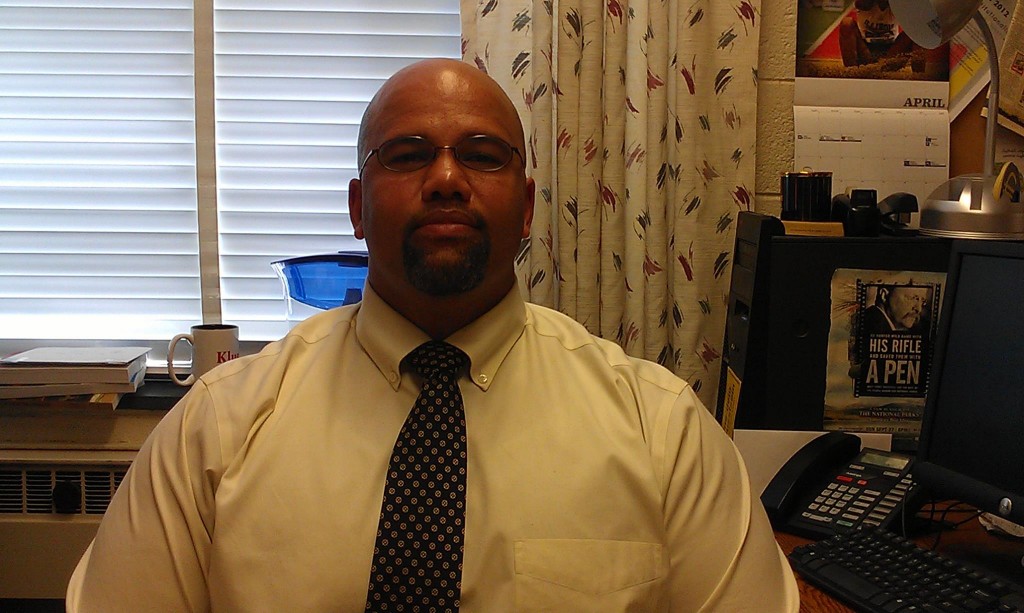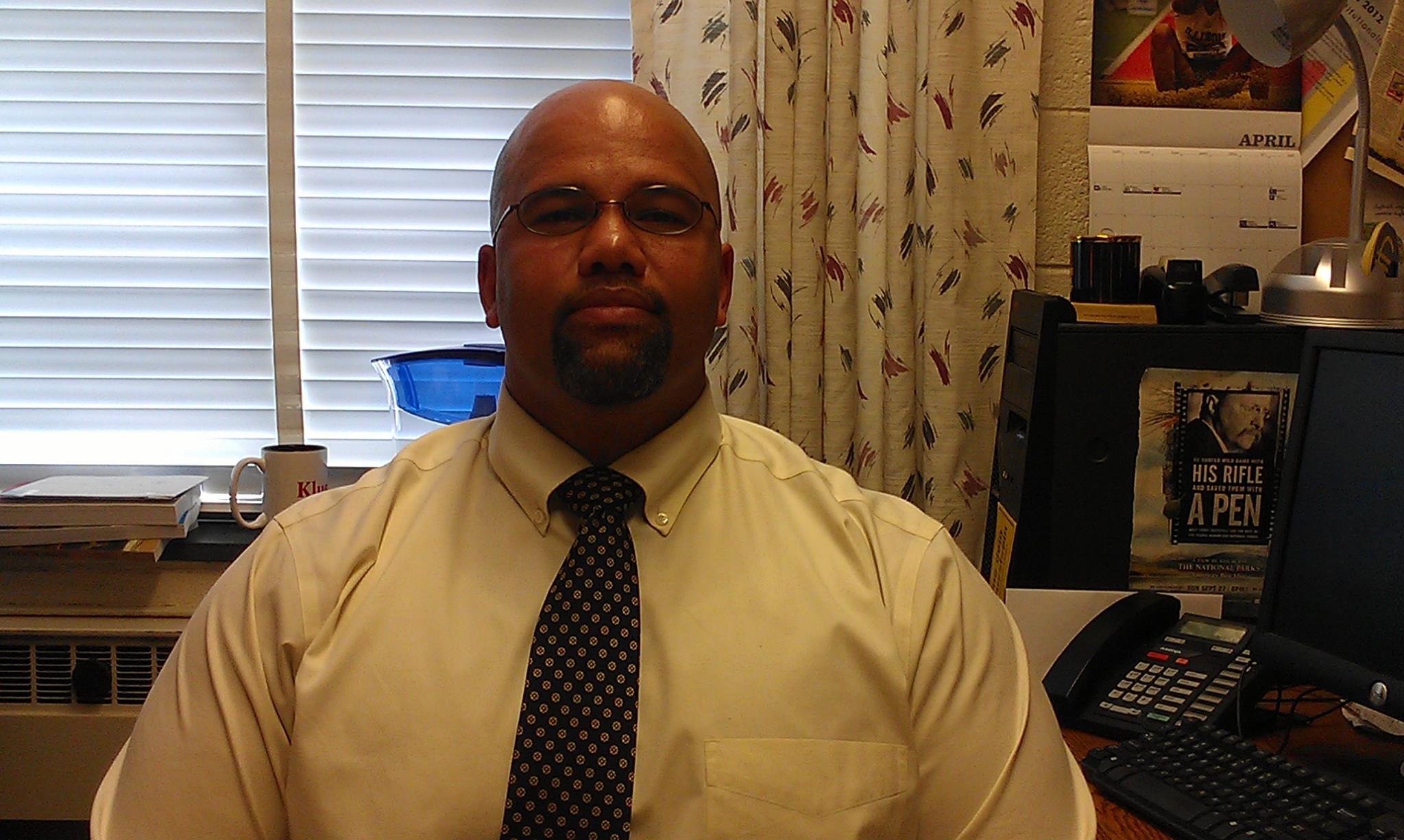

Photo Credit / Jessica Heitzman
BY JESSICA HEITZMAN
SC STAFF WRITER
A very busy man, dressed in a grey suit and red tie, sits behind the professor’s desk as he talks on the phone. I sympathize for him, hoping that our time together isn’t hindering on something more important he needs to attend to. However, I take the moment to look around his office to find out who this man really is.
His poor office squeezed around us, barely allowing for any movement. The office is filled from floor to ceiling with books; books that consisted of history, law and more importantly German.
He has textbooks, history books and dictionaries all revolved around the world of Germany. Here was a man devoting his life to something he loved and making a statement about it. For a small room, he really brings his office to life with his interests in history and German.
Dr. Christopher Brooks is a professor in the History department at East Stroudsburg University. He specializes in a plethora of areas including: U.S. Legal and Constitutional History, 20th Century European Political History (especially Germany), Early American Republic and a few other areas.
Dr. Brooks was born and raised in New Jersey. As a child he moved to Moorestown, NJ, about 50 miles from ESU, where he feels more connected to than the town he was born in. Moorestown is home to some signers of the Declaration of Independence, and it was a hub for the American Revolution.
Dr. Brooks ended up being recruited to ESU in Track and Field. He knew ESU was the right choice because the department had faculty who really spent time with the students. The professors really honed on the student’s skills. “I’m happy to be back and participating in that,” says Brooks.
Ryan Stevens, a Political Science major and German minor at ESU says, “A lot of professors stand in front of their class lecturing on a topic, but Dr. Brooks actively engages students, asking students to answer questions throughout class which helps students stay on top of the readings. I took his class for my German minor even though I already had a history course and do not regret it at all.”
Dr. Brooks hadn’t always lived in the United States. He moved abroad to Germany where he lived, worked and studied for six years.
Dr. Brooks received his Bachelor’s degree at ESU, double majored in history and philosophy and minored in criminal justice. He then received his Master’s degree, also at ESU, in American History. He then moved on to receive his Ph.D. in Frankfurt, Germany at the University of Kassel under Horst Dippel. “I’m one of only two people to complete a Ph.D. under him,” says Brooks.
Currently, at ESU, Dr. Brooks is building up a system of internships for students who wish to go to law school before they go; that way the students will know what law school is all about.
“I’ve got about three law firms in place now,” says Brooks. “I’m trying to use my personal connections to build that up. A lot of those contacts are overseas.” Dr. Brooks has some firms in Philadelphia and other local areas like NJ.
Dr. Brooks has been busy since joining the staff at ESU. He has published a book chapter. He has a book manuscript which has just been accepted by publishers. He is a co-author for the manuscript on the German employment law, which is supposed to come out in the late summer.
Not only is Dr. Brooks busy writing and teaching, but he also is involved in activities on campus. He is involved in athletics, diversity initiatives, helping out the foreign language department and establishing a reciprocal exchange program with Wuppertal University in Germany.
“That was a promise I made upon hiring, during my interview,” says Brooks. “When I was interviewed here, I was asked by the Dean what I wanted to do here, and I told him I’m going to establish a reciprocal, a sort of exchange program with the German institution because I saw how much studying there helped me, and how much it opened up my world.” Dr. Brooks says that learning German led to a surplus of opportunities for him, wonderful opportunities.
“Germans or rather Europeans in general, are shocked when an American can come into a room and converse in a given language,” says Brooks. “I can’t put a price tag on that kind of skill.” Dr. Brooks says that one of his students that studied abroad said it changed his life, and he intends on returning to Germany to work there in the future.
The Wuppertal program isn’t as successful as Dr. Brooks would like, unfortunately. Part of the reasoning behind that is that the program hasn’t really been advertised as he would like it to be. In the coming months, Dr. Brooks will be working on this goal and speaking with Dr. Meier, the German professor at ESU, about it.
It’s quite unfortunate that the Study Abroad program isn’t as popular as it should be. It seems, however, that German in general isn’t getting the publicity and popularity as it should. For years now, ESU has dropped German as a major and now only employs a part-time professor, so that the minor may still proceed.
Unfortunately, with budget cuts, the issue worsens with time. Because the German professor is only part-time and only German I or German II is offered a semester, the size of the classes cap off more quickly. “We see here at East Stroudsburg University,” says Dr. Brooks, “now that we have a very engaging teacher for German, she had to turn people away.”
With the fact that the German classes are capping at 40 students per class, and Dr. Meier still has to turn students away, why isn’t the university opening its eyes and realizing that the German language has major potential? Dr. Brooks is troubled by this fact, but he also understands that the university only has so much money, so it isn’t right to blame them.
“As an institution,” says Dr. Brooks, “looking at the financial opportunities we have right before us, we need to take them. And because there’s such a culture connection to the country, it’s a natural marriage. And that’s what I don’t understand. It’s not to belittle the other languages that are taught, I’m just questioning despite the numbers, the engagement, the economic advantage, why the resources aren’t being put into German to allow it to be a full-time person and perhaps, a part-time person on top of that to really push the program.”
Dr. Brooks also mentions that it’s frustrating that he doesn’t know what to tell students when they come to him and say that they want to do this or that, and they can’t because the university has such limited resources.
What needs to be done to bring the German language back to ESU, to its full potential, is that the university needs to change the perception of the language. The university needs to bring in bankers, lawyers, politicians and business leaders from Germany who demonstrates a certain interest.
Dr. Brooks says that he would be happy to take part in making that happen. “I have hundreds of contacts in Germany.” He knows that if he picked up the phone and called someone who is head of the HR department for a chemical company who manufactures in Frankfurt, Germany, and says, “I got somebody. Could this person go over there for four to six weeks?” he could easily land the student a job.
Dr. Brooks says, however, “I don’t want to send someone over there who only has one or two semesters of German. It would look better for our institution if the student is able to demonstrate a high level of competency and wows them. We’re helping the student, the student’s helping us. It’s a reciprocal relationship.”
Unfortunately, students don’t know how bad German is actually suffering at the university. It’s obvious that student’s won’t know if they don’t care, but they should care. Dr. Brooks explains that German is a nine on a 1/10 scale.
ESU has at least 700 students in business management, and one of America’s biggest trading partners is the European Union. “Germany is more powerful than Britain right now,” says Dr. Brooks. “Learning their language would open doors for you like you’d never imagine.” It did for him.
Dr. Brooks is just one of the more than 300 highly-credentialed faculty who teach at East Stroudsburg University. The university opened its doors to the public in 1893.
Today, ESU offers 58 undergraduate degrees and 22 graduate degrees. Just recently, ESU has found a new president, Marcia Welsh, in fall 2012. She has an upcoming inauguration ceremony that will be held in April.
Email Jessica at:
jmh2643@live.esu.edu

